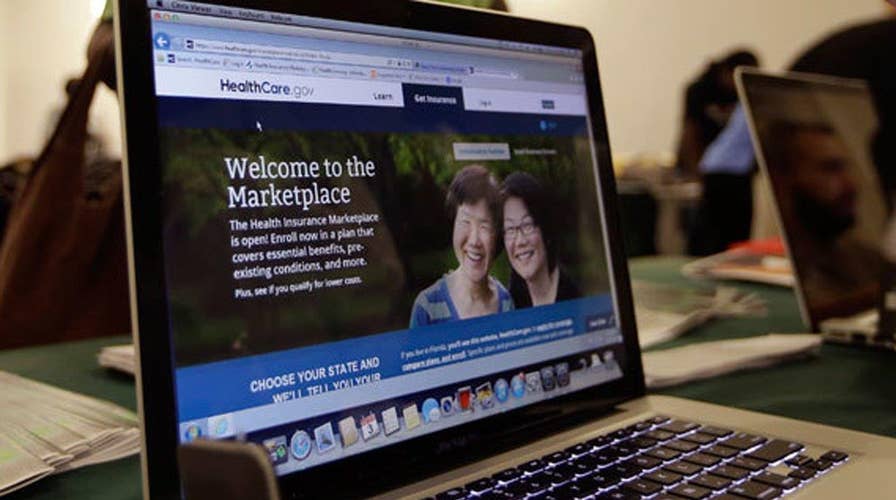Which states will be hit hardest by ObamaCare premium hike?
'America's Newsroom' goes inside the numbers
The Obama administration is trying to calm the panic over soaring ObamaCare premiums by pointing to subsidies many will receive to offset the cost -- but analysts and GOP lawmakers counter that those subsidies nevertheless will stick taxpayers with a rising bill.
With enrollment set to begin Nov. 1, the administration announced Monday that premiums are set rise an average of 25 percent across the 39 states served by the federally run online market. Some states, such as Arizona, will see premiums jump by as much as 116 percent.
Department of Health and Human Services officials are stressing that subsidies provided under the law, which are designed to rise alongside premiums, will insulate most customers from sticker shock.
But the rising cost of subsidies, which already totals tens of billions a year, would be passed on to the taxpayer.
“Taxpayers are already in for a lot,” Tom Miller, resident fellow at the American Enterprise Institute, told FoxNews.com. “The cost doesn’t go away, it just goes into someone else’s pocket.”
In a March report, the non-partisan Congressional Budget Office estimated that subsidies given to enrollees in 2016 would amount to $43 billion in 2016, and predicted the cost would rise to $106 billion by 2026. It also said that over 10 years, ObamaCare provisions would reduce the deficit thanks to tax provisions and cuts to Medicare.
That was before the latest announcement by the administration. It's unclear how exactly the looming premium hikes will affect that picture, though Republicans are now seeking new estimates.
Analysts say it's safe to assume taxpayer costs will rise. Miller noted that HHS reported an average subsidy of $291 per month in 2016. A 25 percent increase in premiums would theoretically translate into an extra $73 per month, or about $870 a year per person.
“If you assume conservatively that there’s 10 million people getting subsidies, that’s an extra $8.5 billion in extra costs taxpayers are getting hit by going into next year,” he said.
Other experts warned this is likely to continue as long as premiums keep rising.
“Its real simple, premiums are going up and up, and subsidies are going to go up with them,” Douglas Holtz-Eakin, president of the American Action Forum and a former CBO director, told FoxNews.com.
The Department for Health and Human Services, when asked for comment by FoxNews.com, noted that the law’s coverage provisions are set to cost 28 percent less in 2019 than the CBO originally projected, amounting to about $49 billion less than originally predicted when the law was signed in 2010.
A spokesman also said the same office predicted that repealing the law would increase the deficit by approximately $350 billion over 10 years.
Holtz-Eakin urged caution on the administration’s analysis.
“It’s been a mixed pattern, because the enrollments haven’t been what they expected so it hasn’t been as big of an impact financially,” he said. “The bad news is that spending per person is much higher than anticipated due to subsidy increases because of premium hikes.”
One of the biggest ObamaCare costs to taxpayers has been absorbed into the Medicaid budget, paid for by both state and federal governments.
As a sweetener to get states to go along with the plan, the federal government offered to pick up the cost of expanding Medicaid eligibility up to 133 percent of the poverty line. That siphoned low income -- and expensive – customers away from ObamaCare exchanges, seemingly contributing to its current solvency. But that cost – in the hundreds of billions -- also is borne by taxpayers.
The CBO projected in 2013 that, in part due to ObamaCare, federal Medicaid spending would more than double over the next 10 years, topping $554 billion by 2023. State governments pay another $160 billion toward Medicaid.
“Volume has been greater in Medicaid, and per person costs have been much higher than expected,” Edmund Haislmaier, senior fellow at the Heritage Foundation, told FoxNews.com.
Sensing a spike in taxpayer costs, the Republican-led House Committee on Energy and Commerce has written to the Centers for Medicare and Medicaid Services demanding how much taxpayer money will be spent subsidizing the cost of rising premiums.
“While the Administration continues to focus on premium 'affordability,' it ignores the undeniable fact that federal taxpayers are subsidizing these premium increases through tax credits,” the letter from Chairman Fred Upton, R-Mich., says. "The Committee is concerned that the federal taxpayer continues to bear the burden of subsidizing the growing cost of health care insurance.”
The committee is demanding estimates of the amount of money spent covering rising premiums by Nov. 7.





















